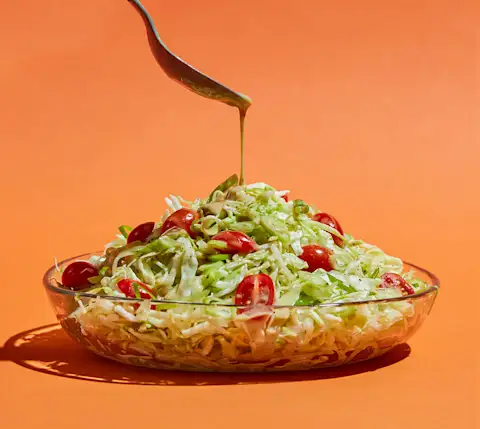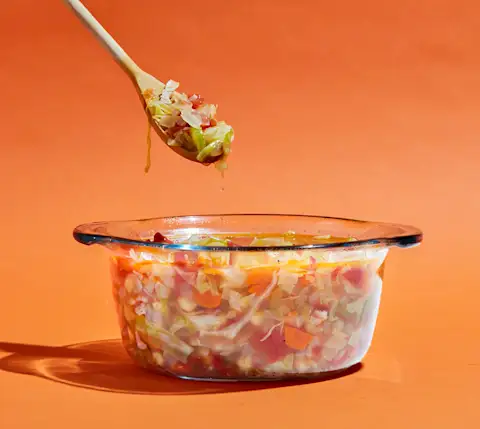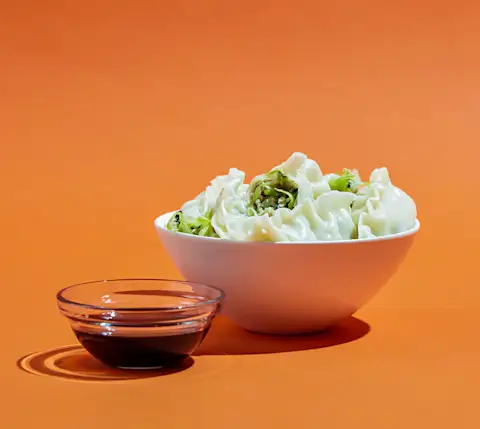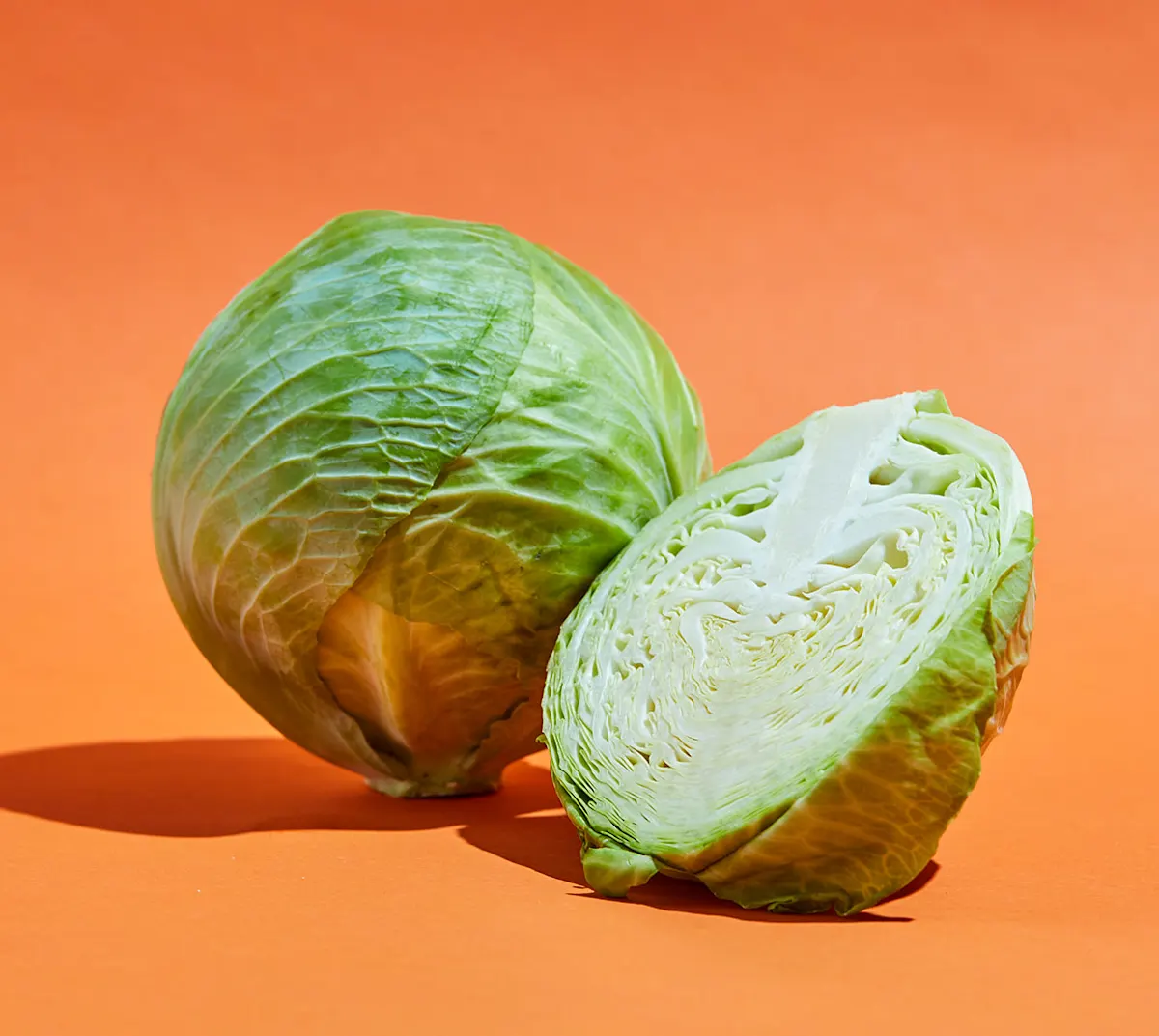There is almost always a chunk of green cabbage in the vegetable drawer of my fridge. Why? Well, cabbage lasts. The carrots droop, the lettuce mix turns swampy, and the over-the-hill cucumbers? We are all familiar with those total horror shows. Cabbage at worst gets discolored on its cut surface after a few weeks. Trim that part off, and it’s practically as good as new.
But even better than the longevity of this humble vegetable is its versatility. Cabbage can turn into a last-resort salad when the leafy greens are M.I.A. It can take anything you’d throw at broccoli or cauliflower, making for a perfect crisp-tender cooked vegetable. And oftentimes, it becomes a great centerpiece for a meatless meal. Here are a few of my favorite ways to cook with cabbage.

Shred for salad.
We’re one of those families that likes a salad on the table with most meals, and green cabbage salad is our default during cooler months. Sliced thinly, cabbage is very good with olive oil and seasoned rice vinegar, but bottled Japanese sesame dressing perked up with a squeeze of lemon or splash of vinegar is my usual go-to. Slivered scallion greens and halved cherry tomatoes are nice additions, if you have them.

Cut into thick slabs and roast.
Brush with roasted sesame oil, olive oil, or melted butter; sprinkle with salt; and roast at 400 degrees for about 20 to 25 minutes. Bigger chunks — say, two to three inches — benefit for an additional 10 minutes under foil. Let the edges brown, though! That’s the good stuff. It’s the perfect entree for a Southern-style meal with creamed potatoes, a tomato and onion salad, and a nice fat wedge of cornbread.

Chop coarsely for a veggie stew.
I always find the most flavorful meals start with a sofrito: just some nice, finely chopped aromatics (onion, ginger, garlic, carrot, celery, even fennel) cooked low and slow in a good glug of olive oil (or some diced bacon or ham) and a generous dash of seasoning (anything from garam masala to Lawry’s, tbh). Add roughly chopped cabbage, and once it’s wilted, pour in a can of rinsed chickpeas and a can of diced tomatoes (with its juice). Then cover and simmer it for 10 to 15 minutes, adding a splash of water as needed. With a dollop of yogurt, some torn cilantro, and a spoon of chili crisp, dinner is served.

Wilt for cold noodles.
Shred the cabbage and massage a big, four-finger pinch of salt into it. Wait 10 minutes while the leaves relax and turn a brilliant emerald green. Meanwhile, toss together everything you like for a tangy soy-based soba noodle salad. I’m partial to shredded carrots, shelled edamame, thinly sliced shiitake caps, and maybe a bit of reconstituted hijiki seaweed. Or sesame noodles with chopped scallions, shredded leftover chicken, and some crumbled extra-firm tofu. That cabbage will freshen whatever cold noodles you go for and add great texture.

Turn into sauerkraut.
Was it cool seeing how quickly the cabbage wilted? If you add a bit more salt, it will end up swimming in its own expressed juices and transform into this fridge staple. For one head of finely shredded cabbage, you’ll need about four teaspoons of salt, but if you only have a wedge, a heaping soup spoonful will get that fermentation started. Pack the salted cabbage in a jar and place a weight on top to keep it submerged in the juice. Then cover the opening with a cheesecloth secured with a rubber band, and stick it in a cool place for a few days. Replace with a screw-top lid and keep in the fridge for several months. You now have your favorite new sandwich garnish.

Stuff into potstickers or egg rolls.
Cut a half cabbage into thick slices and steam in a basket over simmering water until it’s tender, about 10 to 12 minutes. Let cool until you can handle, then wrap it up in a dish towel and squeeze, squeeze, squeeze until the liquid stops leaking out. Chop the cabbage finely and add a pound of ground pork, three or four chopped scallions, some minced ginger and garlic, a drizzle of roasted sesame oil, salt, and soy sauce. (If you’ve got MSG at home, you know a teaspoon can only help matters.) Fry up a little patty of your concoction to taste for seasoning. Pinch the filling inside round dumpling skins (check an online tutorial if you need pleating help). Place about a dozen dumplings in an oiled skillet and let the bottoms brown, then add about 1/3 cup of water, cover the skillet and let the dumplings steam. When the liquid is nearly gone, remove the lid and let them sizzle until the skillet is dry and the bottoms crisp. Any gyoza you don’t eat right away can be frozen — just place them on a sheet pan and freeze until solid, then transfer to a plastic bag.
Shop GroceryPHOTO CREDIT:
Photographer: Paul Quitoriano
Stylist: Mary Rupp
Art Direction: Sarah Ceniceros





